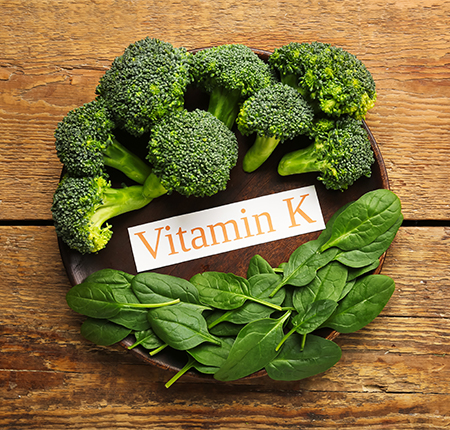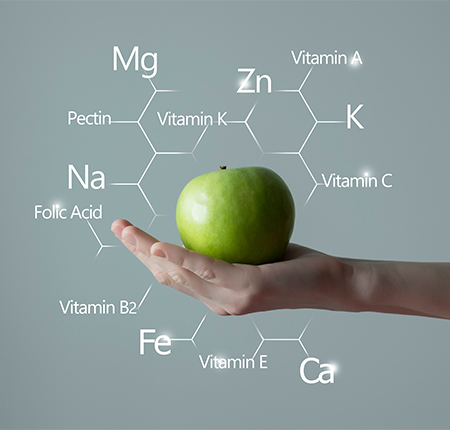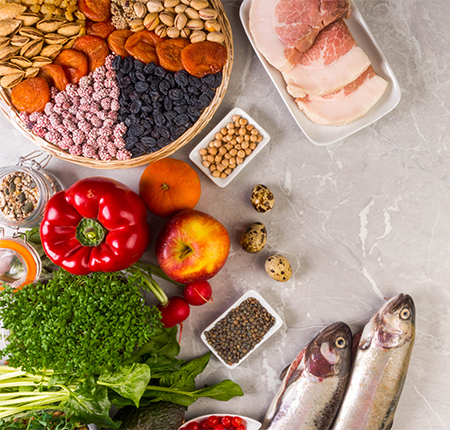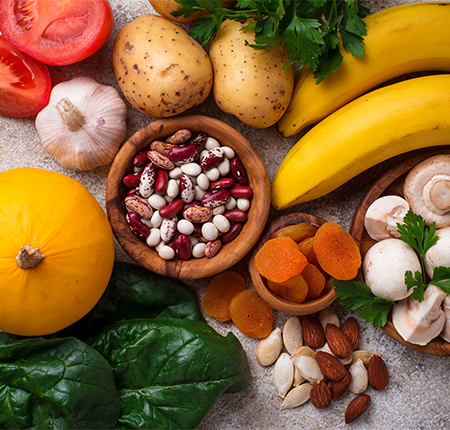
Vitamin K - ALL about Administration, Benefits & Contraindications
You hear less often about vitamin K when we talk about food supplements. You are used to supplementing with vitamins C and D, with Omega 3 and 6, with Iron, Magnesium and Zinc, but K is less known. However, if you've ever used a multivitamin complex, it was most likely vitamin K in there too - do you know what it does for you? Let's see together what the role of this nutrient is, what benefits it has, what foods we find it in and how it affects our menstruation and life.

What is vitamin K and what role does it play?
We call "vitamin K" a family of fat-soluble nutrients that we find in the human body at the level of bones, liver, but also in the pancreas, heart and brain. The body quickly breaks down these nutrients and removes them through the excretory system.
Vitamin K helps produce 4 of the 13 proteins needed for the blood clotting process. Its main role is therefore to produce various proteins necessary for blood clotting and bone health.
Prothrombin, for example, is a protein on which the blood clotting process directly depends. In turn, prothrombin is directly dependent on vitamin K, under whose influence it is produced in the liver.
Osteocalcin is another similar example. It is the most important non-collagenous protein in bone tissue, and vitamin K is necessary for its secretion.
What do we mean by this? The K group of vitamins is essential for the optimal functioning of the body because it helps to stop bleeding and heal wounds, to maintain bone health and ultimately to the optimal functioning of the body.
Researchers have also studied its role in cardiovascular health, because vitamin K is also involved in the production of a protein that prevents hardening of the arteries of the heart (matrix Gla protein), thus helping to prevent cardiovascular diseases. However, studies are limited on this topic and a more thorough analysis is needed to obtain conclusive results. 
Forms of Vitamin K (Types of Vitamin K)
I was saying above that by vitamin K we are actually referring to a group of nutrients. That means it is of many kinds. Phylloquinone and menaquinone are its main forms with roles in bone health and blood clotting. Here's what you need to know about the forms of vitamin K:
Phylloquinone (vitamin K1)
It is the most important form and the main source of vitamin K in our diet. We generally find it in green leafy vegetables, vegetable oils, and a few other fruits and vegetables.
It is the most important form and main source of vitamin K in our diet. We generally find it in green leafy vegetables, because it is directly involved in the photosynthesis process. It is also found in vegetable oils, but also in olives, green tea, cotton seeds and certain fruits such as kiwi and avocado.
Its main role is to contribute to the production of proteins that contribute to blood clotting.
Menaquinone (vitamin K2)
We find it in smaller amounts, either produced by bacteria in fermented foods, or in foods of animal origin such as eggs, cheese and meat. Menaquinone can also be produced in the human body, by bacteria in the digestive tract.
The second type of vitamin K2 can be found in smaller amounts in our diet. It can be produced by bacteria in fermented foods, but is also found in animal foods such as eggs, cheese and meat. Menaquinone can also be produced in the human body by bacteria in the digestive tract.
In addition to its basic role in the blood clotting process, vitamin K2 also contributes to the activation of the protein that prevents the calcification process of blood vessels, thus preventing their damage.
Menadione (vitamin K3)
Unlike K1 and K2 that are produced naturally, menadione is a synthetic form of vitamin K, which the liver can convert to K2. It is artificially produced and is not a supplement intended for humans. It is used in the animal husbandry industry to feed birds and pigs, and can also be found in conventional commercial cat and dog food.
Unlike vitamins K1 and K2 that are produced naturally, menadione is a synthetic form of vitamin K that the liver can convert to K2. It is artificially produced and is not a supplement intended for humans. It is used in the animal husbandry industry to feed birds and pigs, and can also be found in conventional commercial cat and dog food.
And this type of vitamin K has an antihemorrhagic role, so it can stop bleeding in animals following parasitic conditions, infections or poisoning.
Symptoms of vitamin K deficiency
It is rare for an adult to be deficient in vitamin K. We usually assimilate a sufficient amount from food. However, there are cases when there is an insufficiency of this nutrient (we will immediately talk about the risk factors), and then such deficiencies can be manifested by:
Uncontrolled bleeding and hemorrhage, even without being caused by a wound;
The appearance of bruises;
The appearance of blood clots under the nails;
Heavy menstruation;
Bleeding of mucous membranes inside the body;
Dark black color and the presence of blood in the stool;
Weakening of the bone system;
Increased risk of osteoporosis;
Increased risk of coronary artery disease
Conditions associated with low vitamin K levels
If our diet is normally sufficient for an optimal level of vitamin K, how does deficiency occur? Most of the time, the imbalance is induced either by a medical condition or by drug treatment. Here are the main risk factors that can lower your vitamin K levels:
Malnutrition;
Lack of vitamin K treatment at birth in babies.
Conditions that influence absorption in the digestive tract: celiac disease, Crohn's disease, cystic fibrosis, ulcerative colitis;
Liver diseases: cirrhosis;
Administration of antibiotics: they can destroy the bacteria that produce vitamin K in the digestive tract and can decrease its level in the body in case of long-term administration;
Administration of anticoagulants: or other drugs that affect the absorption of vitamin K;
Recent bariatric surgery: weight loss surgery;
Excessive alcohol consumption.
Conditions associated with high vitamin K levels
The potential for toxicity is very low and no adverse effects have yet been associated with excess vitamin K consumption. There are not enough studies to identify what happens if you supplement with high doses daily. The only form of vitamin K declared toxic to the human body is menadione.
What we do know, however, is that when it occurs, vitamin K poisoning can lead to:
Jaundice (yellowing);
Hyperbilirubinemia;
Hemolytic anemia;
Neonatal jaundice in newborns;
Vitamin K in Newborns
As rare as they are in adults, deficiencies in this group of nutrients are common in babies. Low vitamin K levels are common and can cause dangerous bleeding:
in newborns, because nutrients do not pass through the placenta and the little ones have a limited number of proteins for blood clotting at birth.
in infants, because vitamin K is found in very small doses in breast milk.
Parents should understand that it is essential that a vitamin K injection be given to the little one immediately after birth. Babies who do not receive this supplement cannot form blood clots and cannot stop bleeding, which is why they are 81 times more likely to have severe bleeding.

Therefore, it is standard procedure for newborns to be given a dose of vitamin K immediately after birth, thus avoiding the complications of a deficiency (ex: bleeding in the intestines or brain, which are not visible but can be fatal) .
Vitamin K - Benefits:
An optimal level of phylloquinone and melaquinone is essential for the healthy functioning of the skeletal and cardiovascular systems. Considering its role in the body, the main benefits of vitamin K are:
Maintains bone health
Vitamin K plays an important role in bone health because it activates many proteins involved in bone formation. Osteocalcin, for example, which is part of the bone matrix and is the main non-collagenous protein in bone tissue, is produced with the help of vitamin K.
A diet deficient in vitamin K, i.e. a diet lacking in green vegetables, is frequently associated with bone fractures. There are currently no studies or research that definitively confirm that an optimal level of phylloquinone and menaquinone in the body can prevent bone problems, but experts suggest that it can reduce the risk of low bone density.
Maintains brain health
An essential function of vitamin K is to regulate calcium not only in the bones but also in the brain. Thus, together with vitamin D, an optimal consumption of phylloquinone can protect brain health and reduce the risk of dementia, cognitive impairment and other neurodegenerative problems associated with old age.
This is also confirmed by studies, which show us that a higher concentration of vitamin K in the brain is associated with a 17% to 20% lower chance of dementia. The risk is also 14-16% lower in the development of Parkinson's and Alzheimer's diseases when there is enough vitamin K in the body.
Protects the heart
Both vitamin K1 and vitamin K2 which is available in several forms, support heart health and lower the risk of heart attacks and other cardiovascular diseases. They prevent mineralization, respectively the accumulation of minerals in the arteries (a normal phenomenon with advancing age). In this way, blood pressure is kept under control and the heart can freely pump blood around the body.
According to statistics, people who regularly eat green vegetables rich in phylloquinone have a significantly lower risk of presenting to the doctor with cases of blocked arteries, although it is not clear exactly how vitamin K works to protect arterial health.
It strengthens the immune system
Vitamin K can function as a co-factor in the formation of certain proteins present in blood plasma (called plasma proteins). Thus, the level of phylloquinone in the body can influence the immune system and especially the inflammatory responses mediated by T cells (lymphocytes with an essential role in cellular immunity, respectively in the identification and destruction of infected or abnormal cells such as viruses and bacteria).
Certain links have been identified between vitamin K levels and various inflammatory diseases, including cancer. But information is currently quite limited and more research is needed before a connection can be made between vitamin K and how it protects the immune system.
It could prevent cancer
Cancerous tumors are complex and there is still no concrete answer to the questions of why people get cancer. In the absence of exact knowledge about the cause, it is impossible to establish with certainty some methods of prophylaxis. Recommendations for prevention are made, in this context, based on observations.
Thus, observational studies suggest that a low intake of vitamin K may increase the risk of cancer. Some research has even found that vitamin K2 can inhibit the spread of cancer cells. Currently, however, the data are contradictory both on the effective forms of vitamin K that can have positive effects, and on the types of cancer that they can influence.
Increases longevity
Increased longevity is an indirect effect seen in people who consume an optimal level of vitamin K. There are statistics that show us a 36% lower risk of death in people with a high intake of vitamin K compared to those with a low intake .
New research confirms the positive and preventive effects of vitamin K on arterial mineralization, cardiovascular disease, diabetes, cancer and neurodegenerative problems. Vitamin K2 supplementation also provides health benefits for all age groups.
Thus, by reducing the chances of death from any of these causes, it indirectly contributes to increasing life chances and improving longevity.
At the same time, vitamin K supports the skin's defense system against the aging process, having a preventive role for multiple diseases associated with aging.
It helps the liver to function healthily
About 25% of adults globally suffer from non-alcoholic fatty liver disease. This favors the accumulation of an excessive number of lipids in the liver cells, which ultimately leads to serious liver diseases.
Under these conditions, new studies suggest that taking vitamin K2 supports liver health and may help prevent non-alcoholic fatty liver disease. And vitamin K1 taken naturally from an adequate diet is associated with a reduced risk of death in patients with chronic liver disease.
Also in patients with liver disease, vitamin K is also used to support blood clotting and reduce the risk of bleeding.
It contributes to the metabolism of calcium in the body
Calcium is the main mineral in bones and teeth, and vitamin K2 plays an essential role in the metabolism of calcium in the body. This activates two proteins with an important action in fixing calcium in the bones, thus forming the link between vitamin D3 and Ca to support bone health.
One of the two proteins that vitamin K puts into action is the GLA matrix protein. It is part of a family of vitamin K-dependent proteins and has the role of preventing calcium deposition in soft tissues. The other is osteocalcin, which is produced in osteoblasts and plays a major role in the deposition of calcium on bone tissues.
Helps heal wounds
When a wound heals, what actually happens is that the blood goes from its liquid state to a viscous, sticky state, and finally turns into that dry crust. If the blood did not thicken, the wound would continue to bleed.
In this whole process, coagulation is a key phenomenon that occurs naturally and without which healing would not be possible. Because vitamin K plays an essential role in the formation of proteins that support blood clotting, it helps stop bleeding and heal injuries.
In the case of patients for whom blood coagulation is difficult (for example those who follow anticoagulant treatment or who suffer from hemophilia), a diet rich in vitamin K or supplements is particularly recommended, in order to maintain an optimal level in the body that support healing.
Vitamin K to stop bleeding
In case of profuse bleeding due to an injury or cut, vitamin K is given to stop the bleeding. This helps the blood to thicken and form clots, which will stop or at least slow down the bleeding.
The body uses this supplement to stimulate the secretion of prothrombin and three of 13 other important blood clotting proteins, thus speeding up healing.
Vitamin K also contributes to the normal functioning of hormones, and therefore can reduce the risk of complications such as excessive menstrual bleeding. However, it is important to differentiate between a hemorrhage, or excessive bleeding (such as a very heavy period or a serious injury) and simple unusual bleeding (such as spotting).
Light bleeding between periods, for example, is not a type of bleeding that can be stopped by taking vitamin K – because here it is not the lack of this nutrient that is the cause, but many other factors that I told you all about HERE .
How long does vitamin K take to stop bleeding?
Phylloquinone starts working after 6-10 hours and reaches its maximum effectiveness after about 24 to 48 hours (1-2 days). But how quickly vitamin K stops a hemorrhage depends on the severity of the bleeding. The age of the patient and the administered dose also matter.
So an important factor that must be taken into account to approximate as accurately as possible how long vitamin K stops bleeding is the size and severity of the injury.
For a small injury, phylloquinone will act quickly and stop the bleeding in just a few hours.
If you are experiencing severe bleeding, or if your body is severely deficient in vitamin K following drug treatments or surgery, then it may take longer for your blood to return to its ability to clot. If, however, the bleeding does not stop, if necessary, at the doctor's recommendation, another dose of vitamin K can be administered after 6-8 hours.
Vitamin K & Menstruation:
If you look at the close connection between vitamin K levels and blood clotting ability, it is obvious that it will have a major impact on menstrual blood as well. If you have heavy periods and need to change your menstrual products every few hours, a vitamin K supplement may help regulate your flow. We discussed more about regulating menstruation with natural solutions in the blog article HERE that we invite you to read. And next we will talk about how important vitamin K is for menstruation and how it influences it.
Vitamin K and heavy menstruation
There is a close connection between a vitamin K deficiency and heavy menstruation. Basically, vitamin K helps regulate menstrual flow during that time of the month. If there are not enough amounts of this vitamin in your body to fulfill its role, this may be the reason why you experience excessive menstrual bleeding.
Another consequence may even be the irregularity of the menstrual cycle, along with mood swings and strong menstrual cramps. Even decreased sex drive during menstruation (and more) can be an effect of lack of vitamin K. Afterwards, heavy blood loss can make you feel dizzy, weak and even anemic.
So because of its ability to support blood thickening and clotting, vitamin K can help regulate your menstrual blood flow. As a result, there are studies showing that patients with primary dysmenorrhea can be given vitamin K injections to stop bleeding and possibly relieve menstrual pain.
Vitamin K and menopause
Vitamin K's role in blood clotting and speeding healing is not of significant use in relieving menopausal symptoms—but it may support relief of hot flashes. Conversely, we cannot say the same about vitamin K2's role in bone health.
After menopause, women are at a higher risk of bone fractures and osteoporosis. By supporting the production of osteocalcin, vitamin K:
slows down the process of weakening the bone system;
decreases the risk of bone fractures by strengthening the bones.
So while it doesn't work miracles for menopause symptoms, nor can it reverse the effects of osteoporosis, vitamin K can help improve bone health after menopause.
Does vitamin K stop or delay periods?
Don't take vitamin K to stop periods because it doesn't work that way. It can reduce the amount of blood you lose during periods if your flow is heavy and you have unusually large blood clots . This means that it only brings the bleeding back to a normal level, not that it induces a hormonal imbalance and stops a natural function of the body.
The fact that vitamin K supports blood thickening and clotting does not mean that it will stop or delay menstrual bleeding. It's just that it can relieve excessive bleeding by supporting the blood's natural clotting ability. If you are experiencing delayed menstruation, the most likely cause is not vitamin K, but other factors that we talked about more HERE .
Vitamin K administration indications:
You can find it in most multivitamins and in separate vitamin K supplements, but the foods you eat should be your main sources—and enough of them. It is not recommended to supplement with this group of nutrients without a doctor's recommendation.
If your doctor recommends supplementation, it's important to take it as directed. And let's now tell a little about what these indications are, and the vitamin K dosage standards, in general.
When to take vitamin K?
You are usually advised to supplement if you are taking anticoagulants, long-term antibiotic treatment, or have a condition that can lead to deficiencies. Also, if you have a hemorrhage, excessive bleeding, or very heavy periods, your doctor may recommend a supplement with K1 and K2.
As a rule, these supplements are taken at any time of the day, in a single dose or several times a day depending on the concentration. Because they are fat-soluble, it is best to take them with a fat source (such as avocado, olives, or a vegetable oil) for optimal absorption. It may also be more beneficial for bone mineral density to take vitamin K with vitamin D.
Recommended dosage of vitamin K by age
After age 19, experts estimate the adequate daily intake of vitamin K at 90 mcg (micrograms) for women, including pregnancy and breastfeeding, and 120 micrograms per day for men. Here are the exact recommended daily doses according to age (which, theoretically, you should be able to assimilate directly from food):
Newborns, 0-6 months: 2mcg;
Babies, 7-12 months: 2.5mcg;
Children, 1-3 years: 30mcg;
Children, 4-8 years: 55mcg;
Children, 9-13 years: 60 mcg;
Girls, 14-18 years: 75 mcg;
Boys, 14-18 years: 75 mcg;
Adult women, after 19 years: 90 mcg;
Pregnant or lactating women, under 19: 75 mcg;
Pregnant or lactating women, 19-50 years: 90 mcg;
Adult men, after age 19: 120 mcg.
Sources - Foods rich in vitamin K:
You can get both phylloquinone (K1) and menaquinone (K2) directly from food. Plant-based foods are rich sources of K1, while animal-based foods generally contain lower amounts of K2. Here are the foods with the highest concentrations of vitamin K:
Fermented soybeans;
Vegetables;
Legume;
Soybean oil;
Fruits;
Eggs;
Meat;
Cheese;
Fish.

Which fruits contain a lot of vitamin K?
The highest amounts are naturally found in green leafy vegetables, but there are also some fruits from which you can assimilate phylloquinone. The fruits richest in vitamin K are:
Pomegranate;
Blueberries;
Dried figs;
The grapes.
Which vegetables are high in vitamin K?
Vegetables are the most important natural source of phylloquinone, and the highest amounts are present in:
Green leafy vegetables (spinach, kale, broccoli, cabbage, radish leaves, Brussels sprouts, lettuce);
Legumes (beans, lentils, soybeans);
Carrots;
Pumpkin.

Vitamin K Contraindications:
general details about contraindications + their list
Before you supplement, it is good to read the leaflet of vitamin K to know exactly what contraindications and adverse effects it might have. We can only tell you that vitamin K is contraindicated or must be consumed with caution in newborns, but also in patients with:
Hereditary hypoprothrombinemia;
Renal failure;
Over-anticoagulation with heparin;
Hypersensitivity to vitamin K.
Frequently Asked Questions
So far we've talked about its role, benefits, recommended dosages, and vitamin K foods, but we're sure you have more questions. We encourage you to address all of these with your doctor, who is best able to give you the right answers based on your own medical history and needs. We've got you covered with the basics, and we'll wrap up our discussion of vitamin K by answering some of the most common questions you might have:
How long does vitamin K take to stop bleeding?
How quickly vitamin K stops a hemorrhage depends on the severity of the bleeding. For a small injury, it will act quickly and stop the bleeding in just a few hours. If you experience severe bleeding, or if your body is severely deficient in vitamin K following drug treatments or surgery, then it may take longer for your blood to return to its ability to clot and for healing to occur.
What can happen if I take vitamin K during my period?
You don't have to worry about vitamin K stopping your period—because it doesn't. But it only reduces the flow if it is strong, because it supports the thickening of the blood and the formation of clots. So if you bleed heavily during your periods and take vitamin K, it may reduce your bleeding and period pain, but not stop it completely.
Does vitamin K have another name?
Yes, vitamin K is also known as phytomenadione. It also has a specific name depending on the form we are referring to. K1 is called phylloquinone, K2 is called melaquinone, and K3 is called menadione, the only one that is not produced naturally nor intended for human consumption.
Bibliography
To write this article, I took data and information from these sources:
NIH, "The use of vitamin K in patients on anticoagulant therapy: a practical guide": https://pubmed.ncbi.nlm.nih.gov/14967065/
Mayo Clinic, “Vitamin K”: https://www.mayoclinic.org/drugs-supplements/vitamin-k-class-oral-route-parenteral-route/proper-use/drg-20069592
About Kids Health, “Vitamin K (phytonadione) for blood clotting”: https://www.aboutkidshealth.ca/vitamin-k-phytonadione-for-blood-clotting
WebMD, “Vitamin K Injection: Uses, Side Effects, and More”: https://www.webmd.com/drugs/2/drug-93625/vitamin-k-injection/details
Springer Link, “Vitamin K and the Immune System”: https://link.springer.com/chapter/10.1007/978-3-030-16073-9_4
Medical News Today, “Health benefits and sources of Vitamin K”: https://www.medicalnewstoday.com/articles/219867#benefits
Cleveland Clinic, “Top Benefits of Vitamin K”: https://health.clevelandclinic.org/vitamin-k






















